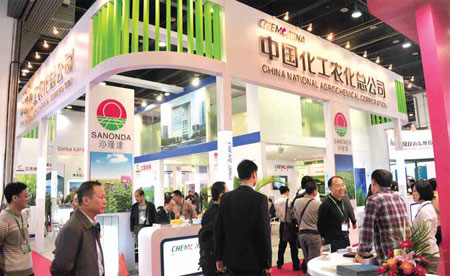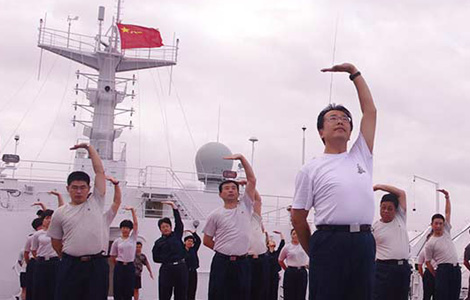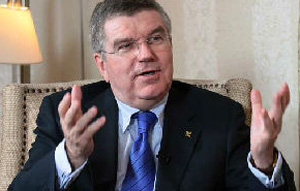Israeli manager sows the seeds of success
Updated: 2013-11-21 07:19
By Wang Zhuoqiong (China Daily USA)
|
||||||||
SOE Agrochemical corp grows in fertile company of foreign merger
They say when in Rome, do as the Romans do. Why not apply this saying in China and, when there, do as the Chinese do?
That is certainly what Israeli Chen Lichtenstein had in mind as he sat in his Beijing office at the headquarters of one of the country's leading State-owned companies.
That is why Lichtenstein, president and chief executive officer of China National Agrochmical Corp (CNAC), a strategic business division of ChemChina, also known as China National Chemical Corp, seems perfectly comfortable in the almost entirely Chinese environment within which he operates.
In 2011, CNAC completed a merger transaction with MAI, Israeli-headquartered Makhteshim Agan Industries, the world's seventh largest crop-chemicals company, through which CNAC became MAI's controlling shareholder.
The Stanford University doctoral degree holder of both the Graduate School of Business and the School of Law, said he is inspired by his new mission, which includes the study of CNAC's Chinese subsidiaries, making investment decisions and building up research and development, distribution and manufacturing foundations.
Lichtenstein admitted that 10 or even five years ago, if one were to predict his present position, he would not believe it. Yet now, as his thinking has evolved and his level of understanding and trust increased, alongside the support received from CNAC management and colleagues alike, he said the ability to execute jobs and the vision of what needs to be done motivates him enormously.
"What I am doing is learning, doing one-on-one interviews and interacting a lot with management and other colleagues, which helps me see and understand the SOE (State-owned-enterprise) and better connect with my team," he said.
His understated confidence comes from the orderly integration process that CNAC and MAI ran in the past 18 months - a process that emerged from study to design and execution.
During this period, which resulted in his recent appointment, Lichtenstein led the integration on behalf of MAI, being MAI's deputy CEO. He realized the surprising similarity between the people of China and Israel.
He said one of the similarities between China and the Israeli people is the long tradition and heritage based on thinking, wisdom and, to an extent, a peaceful way of achieving progress through communication, dialogue and the facilitation of agreement.
Respecting individuals and family values serves as another connection between Chinese and Jewish cultures, he said. A third common point, which builds upon the others, is thoughtful leadership.
"I do not feel I am representing a culture that is conflicting with the Chinese culture when operating in China," he said.
"The Jewish people have almost always been a minority, and found ways to work with other cultures."
The fact that CNAC is acting as a modern SOE, with a vision based on innovation, and identifying as core values the thinking and energy of talented people, is very much alive, he said.
Building something from basic foundations is similar to the creation of Israel, which started things without much in the way of national resources such as land, water and oil.
The former executive director of investment banking at the Goldman Sachs Group Inc, who, before joining MAI, worked for years in London, prioritizes execution over other elements of management.
"The focus now is not to lose time," he said. "It is centered on acting and implementing our vision and plan."
The integration will continue following the transaction. It will consist of their culture, systems, commercial and other aspects, in the coming years.
Asked about difficulties faced in conducting major business transactions like this, he said there are always challenges. But such post-transaction issues are neither down to the Chinese nor to the Israelis.
"When people start working together, they need to choose one way of doing things and take decisions about how to address challenges. But most importantly, they need to do so in a fair and transparent way," he said.
"One needs to address the challenges, not avoid or disregard them."
In his view, ChemChina and CNAC are unique in their approach, because not many large global groups can accommodate and thrive through partnership-based ownership structures.
"Not all entities within ChemChina are wholly owned by the group. ChemChina has well-established partners in China and globally," he said.
Such partnerships sometimes exist in China, yet not on the scale and significance that ChemChina succeeded in creating.
"In many cases, one doesn't see such open-mindedness, commitment and ability to progress things in China and globally as I found in this group," he said.
"A lot is going on here," he added. "There is much empowerment, thinking and creativity. With my background, it is a remarkable setting to operate in."
The composed CEO was reluctant to give advice but agreed to offer brief insights for the benefit of other companies who want to forge alliances between different cultures.
From the Chinese side, it seems the Chinese culture aims to save the other side from facing embarrassment, hence tends to avoid manifesting disagreement, he said.
Later on the dialogue sometimes comes to a halt because there is no easy way of getting both sides to reach a new common ground without someone being placed in a less comfortable position.
"It may be better for the Chinese side to aim to communicate bad news or disagreement early," he said.
For the non-Chinese side, his personal view is that one needs to play one's best act in China. The country, to some extent like the US, cannot be regarded as "one additional market" for multinationals.
One either wants to get immersed in this market or prefer to stay out altogether, said the president.
"Don't keep your best people elsewhere. If you want to play well in China, you have to play your best talent in terms of research and management - and create leadership - that can, over time, emanate from China and be brought out to the world," he said.
Lichtenstein's passion for the Chinese market comes as a result of his observation of the rapidly growing agriculture and life science sectors in the country.
The key role of agriculture in China is underlined by the sheer number of people it affects. That drives the significance attached to farmers and farms by central and local government, he said.
The underdeveloped crop-chemicals distribution channels also attract his interest. In the more developed markets, the top players already control 70 to 80 percent of farmer spending, via semi-captive relationships with a small number of distributors.
Yet in China, even the leading players have a relatively small market share and distribution channels are fragmented, he said.
The strong strategic support of a leading Chinese SOE provides Lichtenstein and his team direction, access and alliances, as well as knowledge about how to build business value in China, as a first step in the vision to develop a leading global enterprise.
The goal of being a leading player in the domestic market is not meant to be achieved only by size but also by gradually driving innovation, he said. They also have high expectations, globally.
"We aim to grow our position internationally through MAI's network, using approaches we develop in China," he said. "The goal is to combine all the efforts and create something in China that can be projected elsewhere."
To achieve the goal, Lichtenstein said the first task is to start with individual customers - the farmers and distributors themselves.
"Unlike other global peers, who perceive the beneficiaries of their actions as crops and plants and their actions as fighting plant disease, an object to be taken care of, we focus on our customers as human beings in their vicinity, someone to learn from and work with. We develop approaches that fit such a relationship," he said.
"We aim to build something that is more consistent with the actual needs of customers in China. This is the direction. The test is in our execution of that plan."
wangzhuoqiong@chinadaily.com.cn
|
China National Agrochemical Corp showcases its products and technology at an industry exhibition. Provided to China Daily |
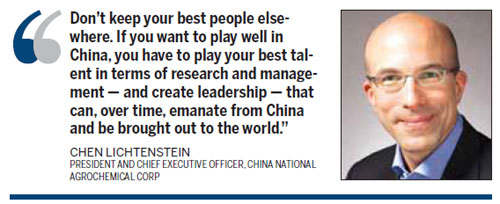
(China Daily USA 11/21/2013 page16)
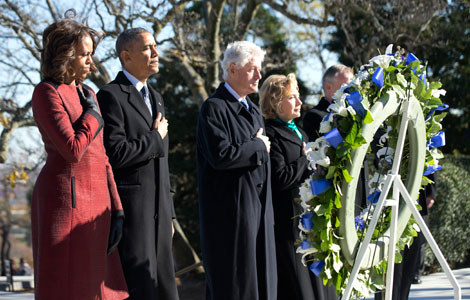
 Obama, Clintons honor Kennedy's assassination
Obama, Clintons honor Kennedy's assassination
 China urges nations on climate funding
China urges nations on climate funding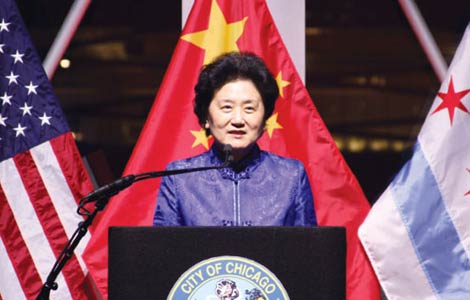
 Vice-Premier praises win-win ties
Vice-Premier praises win-win ties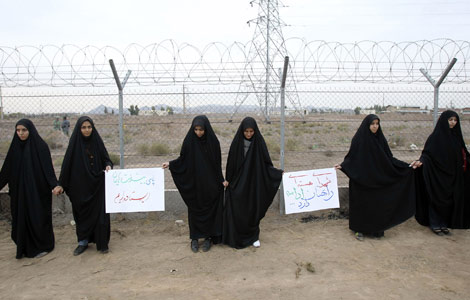
 Hopes rise for accord in nuclear negotiation
Hopes rise for accord in nuclear negotiation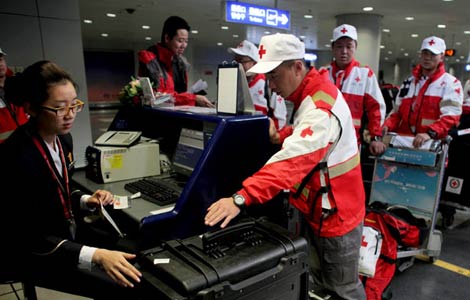
 Rescue team lands in Manila
Rescue team lands in Manila
 SCO meeting to focus on battling terrorism
SCO meeting to focus on battling terrorism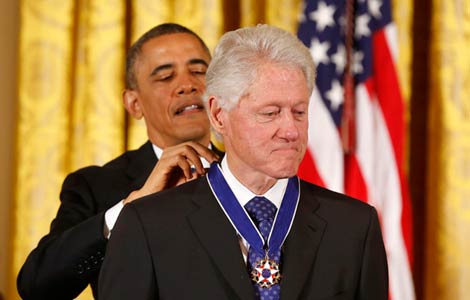
 Obama opens JFK tribute with freedom medals
Obama opens JFK tribute with freedom medals
 Syria's chemical weapons may be destroyed at sea
Syria's chemical weapons may be destroyed at sea
Most Viewed
Editor's Picks

|

|

|

|

|

|
Today's Top News
China confirms visit by US envoy for DPRK
Rice lays out US Asia-Pacific agenda
When should startups think global?
Butterfly Lovers tour concludes in New York
Spokesmen system expands in army
Roadmap 'will curb local debts'
The supercomputer race has no finish line in sight
Chinese pros lured by local firms
US Weekly

|

|
